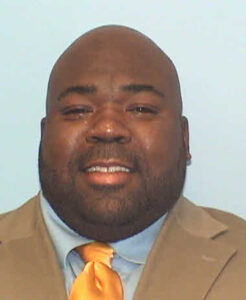Early in Hershaw Davis Jr.’s career, an assignment to work as a floater in the emergency department changed his entire nursing career outcome. Now Davis MSN, RN, an emergency nurse at The Johns Hopkins Hospital and clinical faculty in the Department of Organizational Systems and Adult Health at the University of Maryland School of Nursing, is an established emergency nurse and says his career is an ideal fit.
This week’s celebration of Emergency Nurses Week strikes a chord with Davis, who is also the co-chair of the Diversity, Equity, and Inclusion Committee of the Emergency Nurses Association. He has found a meaningful career in emergency nursing and is committed to helping the next generation of nurses succeed.
Early on, though, nursing could have passed Davis by. “I didn’t know what I wanted to do,” he says, “and didn’t see many male role models in nursing.” At the suggestion of a friend’s mother, he became a Certified Nursing Assistant and that’s where he first worked in the ED. “One day, they floated me to the emergency department and that’s all she wrote,” he says. “It was my speed and challenging and interesting. It was something that can keep me interested for long periods of time.”
Davis followed that by enrolling in an EMT program and then becoming an ER technician in a community hospital. Nursing school was followed by a nurse residency at Johns Hopkins’s emergency department which gave him the foundation he needed, the trauma center experience he wanted, and the opportunity to work in the community where he grew up.
As Davis progressed through his career a couple of things became obvious–his commitment to helping and serving his hometown community and the importance of mentoring the next generation of nurses through sharing his expertise, while teaching and guiding them.
Davis currently practices and teaches which, he says, gives him a needed balance of clinical practice, working with student nurses and peer faculty, and making an impact on the industry at a local and international level (thanks to Johns Hopkins’s global reach). “I am blessed to see both worlds,” he says. “It gives me a wide variety of experiences and helps me give back to the state and city I grew up in.”
The emergency department at Johns Hopkins, all 10,000 square feet of it, is exceptionally busy and includes urgent care, triage, and one of only two Level 1 trauma units in the state. “When someone hears the name of my emergency department, they say, ‘Oh, God bless you,'” he says with a laugh.
Despite the hectic days, Davis says the pace is what keeps him so passionate about his role.
“You walk into the ED and you never know what you are going to get,” he says. For me going to work, it’s like being a medical detective.” Davis says emergency nursing requires top-notch assessment skills, a great deal of flexibility, and a collaborative approach with all the disciplines involved in patient care. “I meet a lot of people, and I work with phenomenal colleagues,” he says. “You just form a connection.” And at Johns Hopkins, he is in the heart of an academic medical institution, so there is a constant flow of new research to learn about as well.
With his teaching role, Davis trains a lot of students, some of whom go on to work with him as nurses. The circular nature of that role is inspiring and gives Davis pause. “One day, it will be time for me to lay down my stethoscope, and they will take over,” he says of the nursing students. “Hopefully, they will have learned what I have imparted to them.”
Throughout his career, Davis says he was often the only Black male nurse present at a meeting or taking care of a patient. Diversity is a pressing issue in nursing, but it takes more than policy to make a change, he says. “It’s one thing to say you want diversity,” he says, “but people need to see a living, breathing example of it. I am straight from East Baltimore. They see me and they know they can do it too.” But to get there, you need to be able to open doors and take a seat when decisions are being made. Davis helps educate younger nurses about what’s needed to change outcomes, to influence their career trajectory, and show them what they can accomplish.
And while Davis acknowledges that progress around diversity in nursing is slow, the fact that conversations about it are even happening shows forward momentum. “What people don’t realize about diversity is you can’t force change,” he says. “That’s what keeps me committed to this work. It’s about the next generation.”
As an emergency nurse, Davis says his involvement in the Emergency Nurses Association has made a big difference. At the annual conference, he builds his network, and he remains constantly inspired by seeing all the different things nurses do and that they excel at. “It helps you refocus why you do what you do,” he says. “Your work isn’t contained to a hospital or even to a community. It lets you know you are part of something bigger.”
- Is the FNP Program Right for You? - April 24, 2024
- WOC Nurses Week Highlights Specialty - April 16, 2024
- Honoring Radiology Nurses Day on April 12 - April 12, 2024


